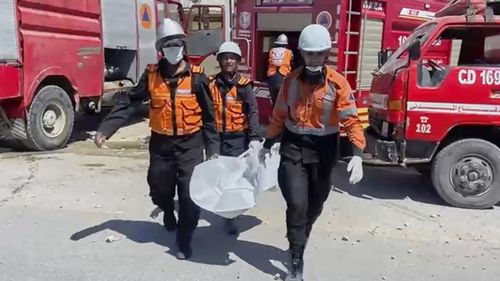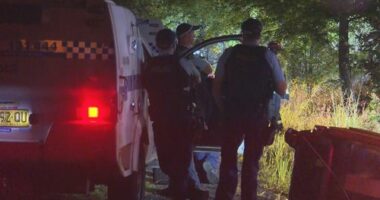Share this @internewscast.com
Among those killed in Israel’s intensified military campaign were nine of a doctor’s ten children, as confirmed by colleagues and the Health Ministry.
A pediatrician at Nasser Hospital, Alaa Najjar, was on her shift when she discovered her family’s residence ablaze, according to Ahmad al-Farra, the chief of the hospital’s pediatric department, speaking to The Associated Press.

COGAT, the Israeli defense agency managing aid to Gaza, stated that since Monday, 388 trucks had crossed into the area. In contrast, during the ceasefire, about 600 trucks were entering daily.
Warnings of famine by food security experts, and images of desperate Palestinians jostling for bowls of food at the ever-shrinking number of charity kitchens, led Israel’s allies to press the government of Prime Minister Benjamin Netanyahu to allow some aid to return.
Netanyahu’s government has sought a new aid delivery and distribution system by a newly established US-backed group, but the United Nations and partners have rejected it, saying it allows Israel to use food as a weapon and violates humanitarian principles.
Israel may now be changing its approach to let aid groups remain in charge of non-food assistance, according to a letter obtained by the AP. Israel accuses Hamas of siphoning off aid but the UN and aid groups deny there is significant diversion.
Hospitals in Gaza are again reporting attacks and other Israeli pressure.

Civilians flee in Rafah as Israel pushes ahead with its offensive
The Health Ministry said 11 security personnel have been trapped at the European Hospital in southern Gaza following heavy gunfire and airstrikes since at least Tuesday. Dr Saleh Hams, director of the nursing department, said patients were evacuated after an Israeli strike on May 13. Hams said the security staff stayed behind to protect from looting, and that it was the only hospital in Gaza offering neurosurgery, cardiac care and cancer treatment.
Israel said it will continue to strike Gaza until Hamas releases all of the 58 remaining Israeli hostages and disarms. Fewer than half of the hostages are believed to be alive since the October 7 attack, in which militants killed some 1200 people, mostly civilians, and abducted 251 others.
Hamas has said it will only return the remaining hostages in exchange for more Palestinian prisoners, a lasting ceasefire and an Israeli withdrawal from the territory. Netanyahu has rejected those terms and has vowed to maintain control over Gaza and facilitate what he refers to as the voluntary emigration of much of its Palestinian population.
“The Israeli government and its leader have a clear choice: deal or war, saving lives or abandonment,” Liran Berman, brother of hostages Gali and Ziv Berman, told a weekly rally in Tel Aviv as families and supporters again demanded an agreement that would bring everyone home.














